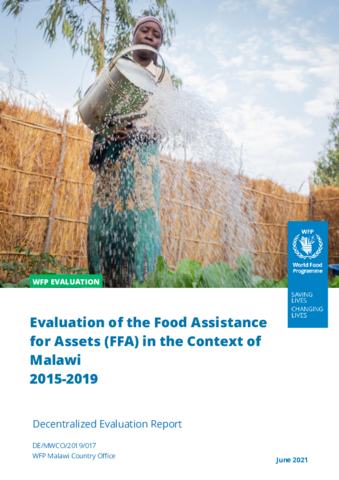
The key objectives of this evaluation were to contribute to identifying inclusive and effective scaling-up strategies to inform CSP implementation and ensure strategic shifts in programming where necessary. The findings will also help refine WFP programming allow donors, development, and international partners to be better informed and supportive of integrated approaches to resilience programming, particularly in the light of COVID-19. The evaluation incorporated both accountability and learning objectives, with greater emphasis on the latter. It focused on assessing the relevance, effectiveness, efficiency, impact and sustainability of the FFA intervention. The overarching evaluation question focused on how effective WFP Malawi’s integrated resilience framework with the use of FFA as the foundation on which packages of interventions is are layered and implemented?
Some of the key evaluation findings included:
- FFA is a proven foundation for designing and implementing integrated resilience initiatives. Local ownership was enabled via cross-sector coordination and community planning, while activities were relevant for community and district-level integration.
- FFA achieved planned outputs over the course of implementation, with some overachievements of targets and some flexible rescheduling of activities in response to contextual factors such as pipeline delays experienced across different FFA districts.
- The integrated approach to resilience building, which saw the connection of FFA to the pilot project initiatives, R4 Rural Resilience Initiative and Global Framework for Climate Services, and the Integrated Risk Management and Climate Services Programme resulted in significant food security outcomes during the implementation period, laying a solid foundation for increased household food consumption and diversification.
- As a result of significant internal and external funding, rapid staffing increases, and improved overall organizational efficiency, WFP efficiently responded to increased FFA needs after 2016.
- There is considerable evidence that FFA effectively trains households to deal with shocks before, during, and after they occur. RIMA findings show that increasing resilience "pillars" leads to stronger resilience "outcomes" and project components.
Key recommendations from the evaluation included:
- WFP needs to weigh up the trade-offs inherent in meeting food needs later at the expense of providing funds for the timely purchase of productive inputs, such as improved seeds and fertiliser.
- FFA should explore additional ways of dealing with new threats and/or shocks that threaten the sustainability of agricultural interventions with the UN and other development partners.
- There is a need for an agency to be an intermediary in implementing weather insurance in communities.
- WFP needs to continue to embed gender equity and women’s empowerment throughout its programming opportunities in order to address strategic and structural barriers to GEWE in the communities.
- FFA should engage with market-based resilience building programs to promote competition in input markets, provide smallholder farmers with more options, and establish new markets for farm and non-farm outputs.
- WFP should work with appropriate government departments and other key stakeholders in Malawi in relation to land tenure arrangements, given the importance of communal land for successful community asset creation.
